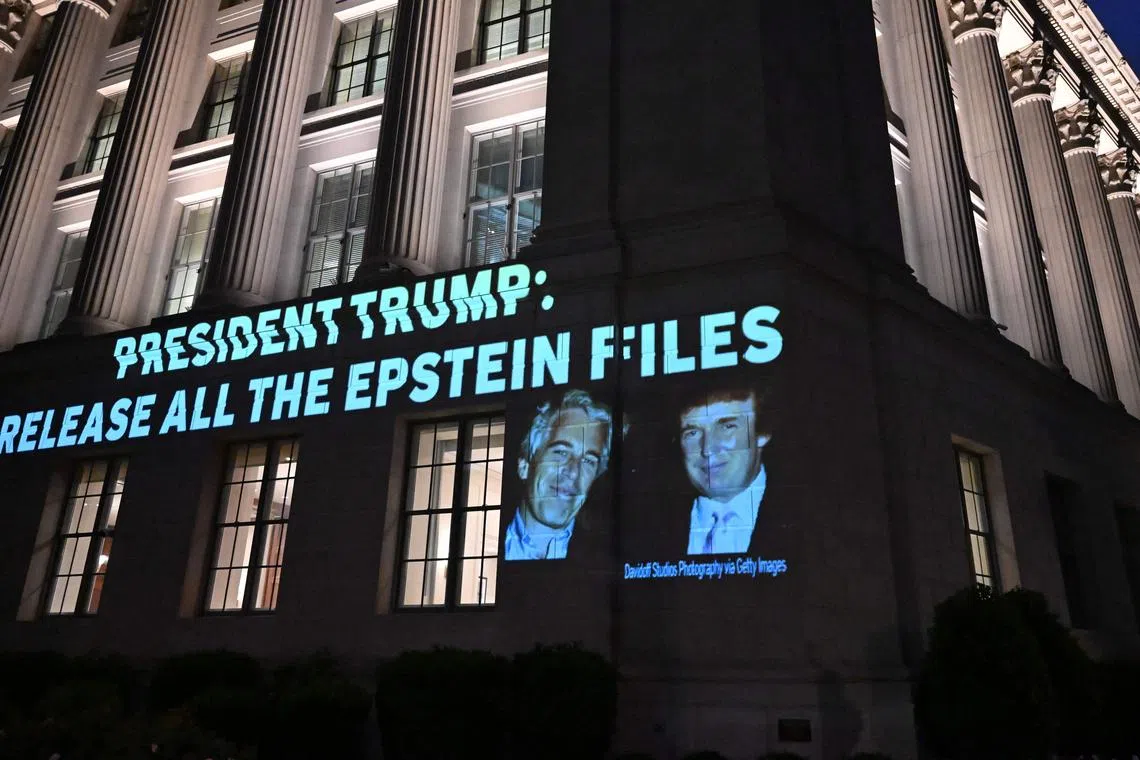White House restricts Wall Street Journal’s access to Trump over Epstein story
Sign up now: Get ST's newsletters delivered to your inbox

The Trump administration’s handling of the Epstein case has threatened to split the Republican’s far-right base.
PHOTO: AFP
Follow topic:
WASHINGTON - The White House on July 22 barred The Wall Street Journal (WSJ) from travelling with US President Donald Trump during his upcoming visit to Scotland, after the newspaper reported that he wrote a bawdy birthday message to his former friend, alleged sex trafficker Jeffrey Epstein.
The move comes after Mr Trump sued the WSJ and its media magnate owner Rupert Murdoch on July 18
The Trump administration’s handling of the Epstein case
The punishment of the Wall Street Journal marks at least the second time the Trump administration has moved to exclude a major news outlet from the press pool over its reporting. Since February, it has barred Associated Press journalists from numerous events
“As the appeals court confirmed, The Wall Street Journal or any other news outlet are not guaranteed special access to cover President Trump in the Oval Office, aboard Air Force One, and in his private workspaces,” said Press Secretary Karoline Leavitt on July 21.
“Due to The Wall Street Journal’s fake and defamatory conduct, they will not be one of the thirteen outlets on board (Air Force One).”
Mr Trump departs this weekend for Scotland, where he owns two golf resorts and will meet British Prime Minister Keir Starmer.
Earlier in June, the US Department of Justice, under Trump-appointed Attorney-General Pam Bondi, said there was no evidence suggesting disgraced financier Epstein had kept a “client list” or was blackmailing powerful figures before his death in 2019.
In its story on July 17, the WSJ reported that Mr Trump had written a suggestive birthday letter to Epstein in 2003, illustrated with a naked woman and alluding to a shared “secret”.
Epstein, a long-time friend of Mr Trump and multiple other high-profile men, was found hanging dead in a New York prison cell in 2019 while awaiting trial on charges that he had sexually exploited dozens of underage girls at his homes in New York and Florida.
The case sparked conspiracy theories, especially among Mr Trump’s far-right voters, about an alleged international cabal of wealthy paedophiles.
Epstein’s death – declared a suicide – before he could face trial supercharged that narrative.
Since returning to power in January, Mr Trump has moved to increase control over the press covering the White House.
In February, the Oval Office stripped the White House Correspondents’ Association (WHCA) of its nearly century-old authority to oversee which outlets have access to certain restricted presidential events, with Mr Trump saying that he was now “calling the shots” on media access.
In a statement, the WHCA president urged the White House to “restore” WSJ to the pool.
“This attempt by the White House to punish a media outlet whose coverage it does not like is deeply troubling, and it defies the First Amendment,” said WHCA president Jiang Weijia.
“Government retaliation against news outlets based on the content of their reporting should concern all who value free speech and an independent media.” AFP

